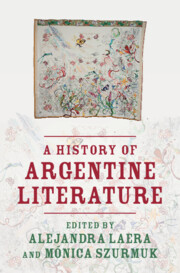Book contents
- A History of Argentine Literature
- A History of Argentine Literature
- Copyright page
- Contents
- Figures
- Contributors
- Editors’ Acknowledgments
- Introduction
- Part I Literary Dates
- Part II Critical Inroads
- Part III Literary Names
- Chapter 21 Sarmiento: Politics, Culture, and Spectacle
- Chapter 22 The Mansilla Siblings: A Story in Syntony
- Chapter 23 Martín Fierro: Subaltern Voices
- Chapter 24 Borges and Argentine Literature: A Detour around the World
- Chapter 25 Roberto Arlt
- Chapter 26 The Ocampo Sisters
- Chapter 27 Alfonsina Storni and Alejandra Pizarnik
- Chapter 28 Displacement and Transfer in Julio Cortázar’s Todos los fuegos el fuego
- Chapter 29 Manuel Puig’s Circuit Bending: Literary Listening against Surveillance
- Chapter 30 Operation Massacre: Dangerous Journalism
- Chapter 31 The Politics of the Poem: From Gelman to Perlongher
- Chapter 32 Scenes from Postmodern Life: Literary Interventions in the Public Sphere
- Chapter 33 Griselda Gambaro and Beyond: A “Dermography” of Contemporary Women’s Theater and Performance
- Chapter 34 César Aira and the Art of Invention
- Index
- References
Chapter 22 - The Mansilla Siblings: A Story in Syntony
from Part III - Literary Names
Published online by Cambridge University Press: 09 May 2024
- A History of Argentine Literature
- A History of Argentine Literature
- Copyright page
- Contents
- Figures
- Contributors
- Editors’ Acknowledgments
- Introduction
- Part I Literary Dates
- Part II Critical Inroads
- Part III Literary Names
- Chapter 21 Sarmiento: Politics, Culture, and Spectacle
- Chapter 22 The Mansilla Siblings: A Story in Syntony
- Chapter 23 Martín Fierro: Subaltern Voices
- Chapter 24 Borges and Argentine Literature: A Detour around the World
- Chapter 25 Roberto Arlt
- Chapter 26 The Ocampo Sisters
- Chapter 27 Alfonsina Storni and Alejandra Pizarnik
- Chapter 28 Displacement and Transfer in Julio Cortázar’s Todos los fuegos el fuego
- Chapter 29 Manuel Puig’s Circuit Bending: Literary Listening against Surveillance
- Chapter 30 Operation Massacre: Dangerous Journalism
- Chapter 31 The Politics of the Poem: From Gelman to Perlongher
- Chapter 32 Scenes from Postmodern Life: Literary Interventions in the Public Sphere
- Chapter 33 Griselda Gambaro and Beyond: A “Dermography” of Contemporary Women’s Theater and Performance
- Chapter 34 César Aira and the Art of Invention
- Index
- References
Summary
This chapter analyzes the works of brother and sister Lucio Victorio Mansilla and Eduarda Mansilla, two fundamental figures in the cultural life of nineteenth-century Argentina, whose personal trajectories took them to Europe and the United States. Journalist, military man, and politician Lucio penned what can be considered the first ethnographic record of the Indigenous peoples of the Pampas; Eduardo was an accomplished novelist, travel writer, journalist, and musician who published in both Spanish and French. In this chapter the work of both siblings is read together. It takes into account the centrality of Lucio in the field of Argentinean literature and proposes that Eduarda illuminates different areas of the cultural intellectual life of nineteenth-century Argentina. Focus is on Una excursión a los indios ranqueles (1870) by Lucio V. Mansilla and two novels by Eduarda Mansilla – El médico de San Luis (1860) and Pablo ou la vie dans les pampas, published in French in 1869 and translated by Lucio – to reflect on the relationship between narration and the state, practices of everyday life, sociability, and family stories, as well as their circulation and consecration mechanisms.
- Type
- Chapter
- Information
- A History of Argentine Literature , pp. 338 - 355Publisher: Cambridge University PressPrint publication year: 2024



